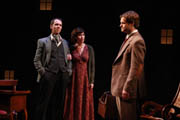
Dorothy Chansky
Here and Nows and Everafter
Review of "Such Things Only Happen in Books"
An Evening of Short Plays by Thornton Wilder
Keen Company at The Clurman Theatre/Theatre Row
410 West 42nd Street
October 6-November 14 – Tues. @7; Wed.-Sat. @ 8; Sat. @ 2; Sun.
@ 3
Tickets: $51.25. Ticket.Central.com or (212)279-4200
Reviewed by Dorothy Chansky.
 |
| Paul Niebanck, Sue Cremin, Clayton Apgar. Photo by Suzi Sadler. |
Marriage is dangerous terrain, according to Thornton Wilder. This may seem like an odd notion at first blush, given the homespun (if fragile) happiness many associate with "Our Town," but it runs throughout many of his plays. "The Matchmaker" offers a prescient rant on how housewifedom dulls women and turns them into nattering irrelevants. "The Skin of Our Teeth" hints that wives' obsession with the proprieties and privileges of wedlock expose desperation as much as defining any kind of bedrock or pinnacle of civilization.
In the collection of five one-acts gathered under the umbrella "Such Things Only Happen in Books," the Keen Company valiantly but ploddingly revives three Wilder plays in which one member of a couple has an unsavory secret that is revealed to the other. (The evening's other two offerings are tiny playlets inspired by the New Testament.) The five pieces, directed by Carl Forsman and Jonathan Silverstein, offered against a wall that resembles a hardwood floor with tiny windows in it (the set is by Sandra Goldmark), are woven together by snippets of the song "Simple Gifts," alternately sung, whistled, and strummed. Love, it turns out, is anything but a simple offering.
In "Cement Hands" an upper crust New Englander arranges to have tea with his niece and her fiancé in order to reveal to her what a cheapskate the young very wealthy swain is on a day-to-day basis. He'll endow a foundation, but he won't leave a tip, which, to the uncle, promises a marriage in which his niece will have to beg for spending money. "In Shakespeare and the Bible" pits a wily and now-monied madame—a sort of Mrs. Warren minus the bonhomie—against a former paying customer engaged to her niece. As the scales fall from the girl's eyes, the engagement crumbles. The director for these two cautionary interventions was Mr. Silverstein. "Such Things Only Happen in Books," directed by Mr. Forsman, features a jovial but too self-satisfied novelist utterly blind to the flirtation his wife is carrying on with the local doctor. Such things, she would have him believe, only happen in the hackneyed plots of which he is so fond in his writing.
The company of five actors achieves moments of engaging credibility, especially in "Cement Hands," where Clayton Apgar loses his privileged cool and begins to sweat under the machinations of his fiancée's uncle, played by Edward Blake. Pepper Binkley is feisty as the niece, and Paul Molnar turns in his best performance of the evening as an accommodating waiter, willing to aid the conniving uncle for a very large tip. Otherwise, however, there is a feeling of archness or attitudinizing to many of the performances.
The framing playlets feature, in one instance, an encounter in the afterlife between God and an angel who got a bad rap in the Gospel of John, and, in the other, a group of afflicted people surrounding a pool of water and waiting for the arrival of an angel who does, in fact, heal one of them. The latter was perhaps intended to provide uplift or closure on the evening. Instead, sadly, it mostly made the actors look awkward and showed the playwright conducting a youthful experiment. The bookend pieces were directed by Mr. Forsman, who seems much more at home in the domestic than the supernatural.
| museums | NYTW mail | recordings | coupons | publications | classified |
